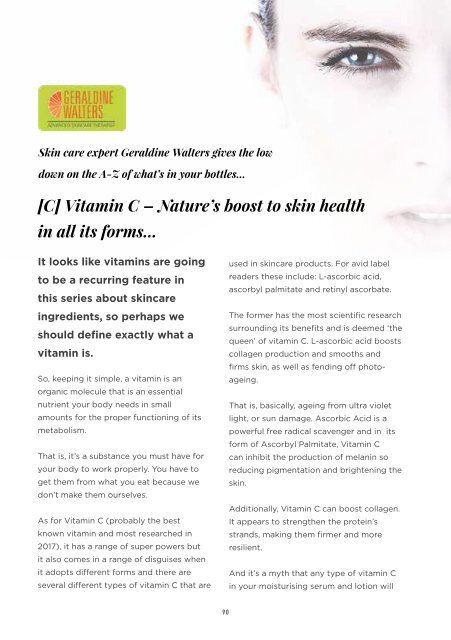Bounce Magazine 78
Featuring Bananarama an exclusive interview with Ben Haenow, top spring beauty products, gift guide for home and garden at Easter, Easter recipes, competitions and our Bounce Loves Royal Baby Special.
Featuring Bananarama an exclusive interview with Ben Haenow, top spring beauty products, gift guide for home and garden at Easter, Easter recipes, competitions and our Bounce Loves Royal Baby Special.
Create successful ePaper yourself
Turn your PDF publications into a flip-book with our unique Google optimized e-Paper software.
APRIL 2019 | ISSUE #<strong>78</strong><br />
Skin care expert Geraldine Walters gives the low<br />
down on the A-Z of what’s in your bottles...<br />
[C] Vitamin C – Nature’s boost to skin health<br />
in all its forms...<br />
It looks like vitamins are going<br />
to be a recurring feature in<br />
this series about skincare<br />
ingredients, so perhaps we<br />
should define exactly what a<br />
vitamin is.<br />
So, keeping it simple, a vitamin is an<br />
organic molecule that is an essential<br />
nutrient your body needs in small<br />
amounts for the proper functioning of its<br />
metabolism.<br />
That is, it’s a substance you must have for<br />
your body to work properly. You have to<br />
get them from what you eat because we<br />
don’t make them ourselves.<br />
As for Vitamin C (probably the best<br />
known vitamin and most researched in<br />
2017), it has a range of super powers but<br />
it also comes in a range of disguises when<br />
it adopts different forms and there are<br />
several different types of vitamin C that are<br />
used in skincare products. For avid label<br />
readers these include: L-ascorbic acid,<br />
ascorbyl palmitate and retinyl ascorbate.<br />
The former has the most scientific research<br />
surrounding its benefits and is deemed ‘the<br />
queen’ of vitamin C. L-ascorbic acid boosts<br />
collagen production and smooths and<br />
firms skin, as well as fending off photoageing.<br />
That is, basically, ageing from ultra violet<br />
light, or sun damage. Ascorbic Acid is a<br />
powerful free radical scavenger and in its<br />
form of Ascorbyl Palmitate, Vitamin C<br />
can inhibit the production of melanin so<br />
reducing pigmentation and brightening the<br />
skin.<br />
Additionally, Vitamin C can boost collagen.<br />
It appears to strengthen the protein’s<br />
strands, making them firmer and more<br />
resilient.<br />
And it’s a myth that any type of vitamin C<br />
in your moisturising serum and lotion will<br />
90

















